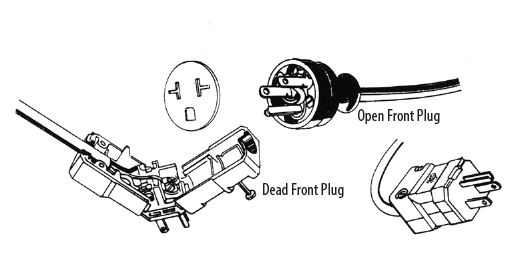The majority of us use electricity every day on the job. This kind of familiarity can create a false sense of security. It’s important to remember that electricity is always a potential source of danger.
The basic rule is simple: consider all electrical wires and equipment to be live until they are tested and proven otherwise.
When we consider electrical hazards on the job, we should watch:
Tools
- Only use tools that are properly grounded or double-insulated.
- Make sure the casings of double-insulated tools are not cracked or broken.
- Always use a ground fault circuit interrupter (GFCI) when using portable electric tools outdoors or in damp or wet locations. GFCIs detect current that may be leaking to the ground from a tool or cord, and they shut off power before injury or damage can happen.
- Any shock or tingle, no matter how slight, means that the tool or equipment should be checked and repaired.
- Never bypass broken switches on tools or equipment by plugging and unplugging the cord. Shutting off power will take too long in an emergency.
- Before drilling, nailing, cutting, or sawing into walls, ceilings, and floors, check for electrical wires or equipment.
Cords
- Make sure that tool cords, extension cords, and plugs are in good condition.
- Never cut off, bend back, or cheat the ground pin on three-prong plugs.
- Make sure the extension cords are the right gauge for the job to prevent overheating, voltage drops, and tool burnout.
- Check extension cords and outlets with a circuit-tester before use.
- Use cords fitted with dead front plugs. These present less risk of shock and short-circuit than open front plugs.

- Don’t use cords that are defective or that have been improperly repaired.
- Don’t wire cords into outlets. Disconnecting takes too long in an emergency.
- Protect cords from traffic – from vehicles or pedestrians. For example, a cart that is pushed over a cord repeatedly can weaken the cord, making it dangerous. Also, pedestrians can trip over cords, leaving them halfway unplugged, which is also hazardous.
Panels
- Temporary panel boards must be securely mounted, protected from weather and water, easily accessible to workers, and kept clear of obstructions.
- Use only fuses or breakers of the recommended amperage. For example, if the electrical system is rated for 30 amps, don’t use a fuse or breaker that’s higher than 30 amps.
- Follow established procedures when locking out panels.
In New Brunswick, the law regarding electrical safety and lock out can be found in General Regulation 91-191 under the Occupational Health and Safety Act, sections 83-84, 239-240, 270, 284, and 286-287.6.


